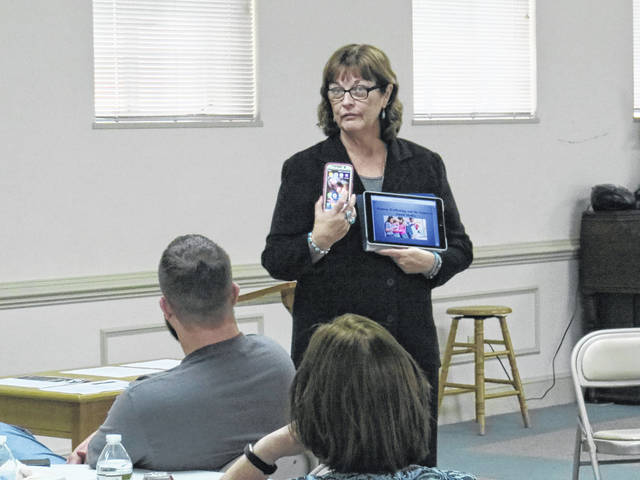ROCKINGHAM — Human trafficking is one of the fastest growing crimes in the United States and, according to the National Human Trafficking Hotline, North Carolina has the eighth most cases in the country, putting it at the center of concerns for many parents and those responsible for the well-being of children.
On Thursday, the Sandhills Center and NC Families United sponsored a presentation on human trafficking and the role social media plays in its spread. Judith Paparozzi, an adjunct professor at UNC-Pembroke who teaches criminal law, criminal justice and human trafficking courses, gave the presentation.
Paparozzi explained that there are many forms of human trafficking, including the slave labor that goes into our cell phones, organ harvesting, child sex tourism and forced prostitution, and that it can happen to people of all ages. She said that because young people are already on social media looking for validation and social media provides so much information about them, predators are able to use that to their advantage to scout their victims and manipulate them behind a veil of anonymity.
“There’s not a crime you could shock me with” after working in nearly every area of corrections since she was 18, Paparozzi said. “For some reason, those things didn’t bother me until this crime. This is the worst crime ever.”
What makes it so bad, she said, is that it targets innocents rather than other criminals and involves treating them as objects to be traded like property. Once a trafficker has their victim, they will then hold them against their will, “break them in” by beating them or raping them, generate information to blackmail them with such as taking illicit pictures of them and finding out where their families live and get them addicted to drugs so that the victim has to rely on their captor even more.
Paparozzi advised that some things parents can do to protect their children from human trafficking is: Don’t give out personal information to strangers, don’t check-in to a location unless your social media account is completely private, turn off GPS tracking in your phone’s camera and any other apps that don’t need it, be wary of social media apps that automatically delete messages and pictures such as Snapchat and talk to them about who they’re speaking to online.
She said parents need to “partner” with their children on this issue rather than trying to force this information on them. To learn more about how to be safe online, go to www.netsmartz.org.
The reason North Carolina has been in the top 10 of states for human trafficking is because of the existence of interstate highways, a large population of transient military service members surrounded by sexually oriented businesses, large rural areas with a high demand for cheap labor, a growing presence of gangs, large sporting events and a long coastline, according to Paparozzi.
It’s a lucrative business as compared to crimes like drug trafficking, Paparozzi said, because the cost to start only requires obtaining a “body” rather than buying drugs in bulk, there’s a low risk because the victims are made to fear their captors so much that they won’t report it to authorities and some victims can be sold for hundreds of thousands of dollars.
Rockingham Police Chief Billy Kelly said their department has not had any investigations into human trafficking to date, but has assisted other agencies in such cases. He said the cases often originate in larger cities and use hotels, and can be difficult to investigate because it’s so difficult for victims to come forward.
“It is difficult for victims to come forward, so much of the investigative effort is self-initiated,” meaning that there is not someone who is reporting the crime, as with most other crimes, Kelly said. “(Self-initiated investigating) involves a lot of man hours doing surveillance and interviews. This requires a substantial amount of time and resources, which makes these investigations difficult.”
Audience members at Paparozzi’s presentation shared stories of near-abductions happening in shopping centers and one woman’s story of a coworker whose daughter was contacted on social media by a 55-year-old man posing as a 19 year old who tried to convince her to run away to Florida with him.
Kelly encourages anyone who sees any suspicious activity to report it immediately to local authorities. You can also call the National Human Trafficking Hotline at 1-888-373-7888 or text “help” to BeFree (233733). Other resources for information on human trafficking are www.polarisproject.org, www.humantraffickinghotline.org and www.hopeforjustice.org.
Dennis Quick, executive director of auxiliary services for Richmond County Schools, said the presentation drove home the fact that this could be happening next door.
“It’s important for people to be cognizant of the reality (human trafficking) so that when we see something, we’re equipped with the knowledge to do something about it,” Quick said.
For Rasheeda Sturdivant, a mother and therapist with Trinity Services where she focuses on domestic violence cases among young women, human trafficking is both a professional and personal concern.
“I want to increase my knowledge so I can do what I can (to help others),” Sturdivant said. “I’m an advocate not only for my daughter but your daughter.”

